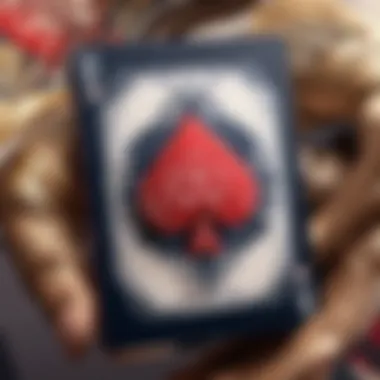Unveiling the Intricacies of Playing Cards: History, Significance, and Uses


Game Overview
Playing cards have been a source of entertainment and fascination for centuries, with a rich history and diverse uses. The intricate designs and symbols on these cards have captivated generations across cultures, offering a window into a world of games and sleight of hand. From traditional card games that test strategy and skill to the mesmerizing art of cardistry that showcases dexterity and creativity, playing cards hold a timeless appeal that transcends borders and languages. This comprehensive guide aims to shed light on the immersive realm of playing cards, catering to enthusiasts and novices alike.
A Brief History of Playing Cards
The origin of playing cards can be traced back to ancient China, where paper playing cards are believed to have been invented during the Tang Dynasty (618-907 AD). These early cards evolved over time and spread to India and Persia, eventually making their way to Europe in the late 14th century. From the elaborate decks of the Mamluks to the iconic French-suited deck that is prevalent today, playing cards have undergone a remarkable transformation, reflecting the social, cultural, and artistic trends of each era.
Types of Playing Cards
Playing cards come in various forms, ranging from standard 52-card decks used in poker and bridge to regional variations like tarot cards and Hanafuda decks. Each type of card deck serves a specific purpose, whether for gaming, fortune-telling, or collectible purposes. The symbols, suits, and design motifs on these cards vary widely, adding to the allure and mystique of exploring different types of playing card decks.
Diverse Uses of Playing Cards
Beyond traditional card games, playing cards have found a myriad of other uses in modern times. Cardistry, the art of flourishing and manipulating cards to create visually stunning displays, has gained popularity as a form of artistic expression and entertainment. Additionally, playing cards have inspired creativity in fields such as magic, graphic design, and even psychology, showcasing the versatile nature of these seemingly simple tools.
Strategy Guides
Tips for Mastering Card Games
For beginners looking to enhance their card game skills, mastering the basic rules and strategies of popular games like poker, blackjack, and rummy is essential. Understanding card probabilities, hand rankings, and bluffing techniques can give players a competitive edge at the gaming table. Practice and patience are key ingredients in sharpening one's card-playing abilities and achieving success in both casual and competitive gameplay.
Advanced Techniques for Seasoned Players
Experienced card players often delve into advanced tactics that involve psychological tactics, game theory, and risk management. From reading opponents' tells to calculating odds on the spot, seasoned players sharpen their decision-making skills to outsmart their counterparts. Expanding one's repertoire of strategies and refining gameplay techniques can elevate a player's command of the game and lead to more consistent victories.
Navigating Map-specific Strategies
In games where spatial awareness and positioning play a crucial role, map-specific strategies can give players a strategic advantage. Understanding chokepoints, sightlines, and spawn zones on different game maps can help players formulate effective tactics for offense and defense. By adapting gameplay strategies to suit the unique features of each map, players can adapt and excel in diverse gaming environments.
Agent-specific Tactics and Playstyles
In games that feature a roster of playable agents with unique abilities, mastering agent-specific tactics is crucial for success. Each agent brings a distinct set of skills and playstyles to the game, requiring players to adapt their strategies based on the strengths and weaknesses of their chosen character. Learning the nuances of each agent's abilities and optimizing their usage can significantly impact a player's performance and contribute to team success.
Player Community
Celebrating Player Achievements
Highlighting standout players who have achieved remarkable feats in the gaming community adds a personal touch to the narrative. Sharing anecdotes of player accomplishments, milestones, and contributions to the gaming scene fosters a sense of community and camaraderie among players. Recognizing the talent and dedication of individuals within the player community helps inspire and motivate others to strive for excellence.
Showcasing Community-generated Content
The creativity and passion of the gaming community are often expressed through user-generated content, including fan art, videos, guides, and more. Showcasing and celebrating community-generated content not only provides a platform for talented individuals to shine but also enriches the overall gaming experience for players. By highlighting the diverse talents and contributions of community members, a vibrant and supportive gaming ecosystem is nurtured.


Engaging in Forum Discussions
Forums serve as virtual meeting places where players can engage in discussions, ask questions, share insights, and connect with like-minded individuals. By shining a spotlight on trending topics within gaming forums, players can stay informed about the latest developments, strategies, and community events. Engaging in forum discussions fosters a sense of belonging and facilitates knowledge sharing among players, contributing to a thriving and interconnected gaming community.
Introduction to Playing Cards
Playing cards have a long and storied history, filled with intrigue and significance. In this article, we will delve deep into the world of playing cards, uncovering their importance in various cultures and contexts. Exploring the origins, evolution, and significance of playing cards can provide valuable insights into the human psyche and societal development. Understanding the role of playing cards in different parts of the world offers a unique perspective on our shared human experience, making this topic a compelling exploration for enthusiasts and novices alike.
Origins of Playing Cards
Ancient Chinese Origins
The ancient Chinese origins of playing cards trace back to centuries ago, reflecting a rich cultural heritage. These early cards were not only used for entertainment but also held symbolic meanings rooted in Chinese traditions. The intricate designs and symbols on these cards offer a glimpse into the aesthetics and beliefs of ancient Chinese society. Exploring the ancient Chinese origins of playing cards sheds light on the ingenuity of our ancestors and the evolution of recreational activities.
Introduction to Europe
The introduction of playing cards to Europe marked a significant cultural exchange that influenced art, gaming, and social interactions. European playing cards adopted varied designs and symbols, reflecting the diverse influences of different regions. The incorporation of suits like hearts, diamonds, spades, and clubs brought a new dimension to card games, adding layers of strategy and identification. Understanding the introduction of playing cards to Europe expands our knowledge of global trade and cultural diffusion.
Evolution of Playing Cards
Incorporation of Symbols
The incorporation of symbols into playing cards revolutionized the way these cards were perceived and used. Symbols added depth and mystery to card games, allowing for different interpretations and strategies. From religious symbols to royal emblems, the incorporation of symbols catered to diverse preferences and tastes. Exploring the evolution of symbols in playing cards showcases the creativity and adaptability of human expression within a constrained format.
Development of Suits
The development of suits in playing cards contributed to the standardization and organization of card decks. Suits provided structure and order to card games, enabling players to distinguish between different cards and their values. The evolution of suits, from medieval icons to modern designs, reflects the changing tastes and trends in card gaming. Understanding the development of suits in playing cards illuminates the interconnectedness of design, functionality, and tradition.
Significance of Playing Cards
Cultural Influence
The cultural influence of playing cards spans across continents and centuries, leaving indelible marks on art, literature, and popular culture. Card games have been integral to social gatherings and rituals, shaping interpersonal relationships and communal bonds. The cultural significance of playing cards extends beyond mere entertainment, reflecting deeper societal values and norms. Exploring the cultural influence of playing cards unveils a tapestry of human connections and interactions that transcend time and space.
Psychological Perspectives
Psychological perspectives on playing cards offer insights into human behavior, decision-making, and cognitive processes. The study of how individuals approach and engage with card games reveals underlying personality traits and attitudes. From risk-taking behavior in poker to strategic planning in bridge, psychological perspectives shed light on our complex relationship with games and uncertainty. Delving into the psychological aspects of playing cards deepens our understanding of ourselves and others, enriching the gaming experience with introspection and analysis.
Types of Playing Cards
Playing cards are a crucial element in various card games and activities, each type offering unique features and designs that appeal to a wide range of players. Understanding the different types of playing cards is essential for appreciating the diversity present in this traditional pastime. From standard decks to specialty designs like tarot cards, exploring the various types adds depth to the overall gaming experience.
Standard Playing Cards
The standard 52-card deck is the foundation of many card games, incorporating four suits - hearts, diamonds, spades, and clubs. This traditional setup has endured for centuries, providing a balanced selection of cards for gameplay. The 52-card deck's consistency and widespread use make it a versatile choice for both casual and competitive players, offering a familiar structure for a multitude of games.


Specialty Playing Cards
Specialty playing cards, such as those with custom designs or themed decks, cater to niche interests and preferences within the gaming community. Custom-designed cards allow for personalization and artistry, enhancing the gaming experience with unique visuals. On the other hand, themed decks, inspired by various motifs or pop culture references, provide a creative twist to traditional gameplay, infusing fun and novelty into card sessions.
Custom Designs
Custom-designed cards offer a personalized touch to gameplay, reflecting individual tastes and aesthetics. These bespoke decks can feature intricate artwork, distinct color palettes, or thematic elements that resonate with the player. While custom designs add a layer of exclusivity and style to card games, they may sometimes lack the universal appeal of standard decks, catering more to niche audiences.
Themed Decks
Themed decks introduce a playful dimension to card games by centering around specific themes or genres. Whether based on popular movies, TV shows, or artistic movements, themed decks provide a unique setting for gameplay, immersing players in a cohesive visual experience. While themed decks offer novelty and creativity, their specialized nature may limit their suitability for a wide range of games or players.
Popular Card Games
Popular card games play a crucial role in the realm of playing cards, offering a diverse range of experiences and entertainment for enthusiasts. Understanding the significance of popular card games in this comprehensive guide is essential for both casual gamers and competitive players. With their rich history and unique gameplay mechanics, popular card games provide a gateway to the fascinating world of playing cards.
Poker
Poker stands out as one of the most iconic and widely recognized card games globally. Its strategic gameplay and blend of skill and luck make it a favorite among card game aficionados. Within the realm of poker, two popular variants include Texas Hold'em and Omaha, each offering distinctive features and appeal.
Texas Hold'em
Texas Hold'em is renowned for its dynamic play style, requiring players to strategize, bluff, and make calculated decisions. The communal cards and betting rounds in Texas Hold'em contribute to its immersive gameplay, fostering intense competition and strategic thinking. This variant's popularity in both casual and competitive settings underscores its engaging nature and broad appeal among players of all levels.
Omaha
Omaha, another prominent poker variant, introduces additional complexity with its unique hand-dealing mechanism and gameplay rules. Players must navigate the challenges of building strong hands with limited information, adding a layer of depth and skill to the overall experience. The distinct characteristics of Omaha, including its tactical nuances and strategic gameplay, position it as a compelling choice for enthusiasts seeking a robust and challenging card game.
Bridge
Bridge exemplifies the art of partnership card games, emphasizing communication, strategy, and coordination between players. Its variants, such as Contract Bridge and Duplicate Bridge, offer nuanced gameplay mechanics and social interaction opportunities, making them ideal choices for players looking to engage in collaborative and intellectually stimulating card games.
Contract Bridge
Contract Bridge is renowned for its intricate bidding system and team-based gameplay structure. The emphasis on communication and synergy between partners elevates the game's strategic depth, fostering a dynamic and engaging playing experience. The strategic maneuvering and cooperative elements inherent in Contract Bridge make it a popular choice for players seeking a challenging and rewarding card game.
Duplicate Bridge
Duplicate Bridge focuses on fair competition and skill evaluation by allowing multiple pairs to play the same hands. This variant emphasizes consistency and decision-making under pressure, providing players with a competitive yet enriching gaming environment. The strategic depth and analytical aspects of Duplicate Bridge make it a favorite among competitive players and those looking to enhance their card game proficiency.
Solitaire
Solitaire, a quintessential single-player card game, offers an engaging way to pass the time and sharpen one's focus and problem-solving skills. Popular variations like Klondike and Spider present players with unique challenges and gameplay mechanics, contributing to a diverse and rewarding solitaire experience.
Klondike


Klondike, a classic solitaire variant, requires players to stack cards and uncover hidden combinations to achieve victory. The game's simple yet addictive nature, coupled with its strategic decision-making opportunities, makes it a timeless favorite among players of all ages. Klondike's accessibility and skill-building potential make it an excellent choice for solo gaming enthusiasts looking for a rewarding card game experience.
Spider
Spider solitaire challenges players to arrange cards in descending order within the tableau, testifying to their patience and strategic thinking abilities. The multiple suits and complex layout in Spider solitaire provide a stimulating mental workout, encouraging players to devise optimal strategies and overcome challenging scenarios. The intricate gameplay and gradual difficulty progression of Spider offer a dynamic and immersive solitaire experience suitable for players seeking a cerebral gaming challenge.
Artistry and Cardistry
Artistry and Cardistry hold a significant place in this article, shedding light on the intricate skills and creativity involved in manipulating playing cards. This section delves into the artistic expression and dexterity required in card manipulation, offering insights into the mesmerizing world of cardistry. By exploring various techniques and flourishes, readers can gain a deeper appreciation for the visual appeal and entertainment value that cardistry adds to the realm of playing cards.
Card Manipulation
Flourishes
Flourishes act as a vital component of card manipulation, enhancing the aesthetic presentation of card routines and performances. These intricate movements involve skillful displays of card handling, adding flair and dynamism to the overall presentation. One of the key characteristics of flourishes is their ability to captivate audiences through visually appealing gestures and seamless transitions between different card techniques. In this article, flourishes are highlighted for their role in elevating the artistry of card manipulation, making them a popular choice among enthusiasts seeking to add a touch of sophistication to their card handling skills.
Shuffles
Shuffling plays a crucial role in card manipulation, ensuring fair play in card games and facilitating the smooth progression of card routines. The key characteristic of shuffles lies in their ability to randomize the card order effectively, preventing any predictability or cheating in games. Shuffles are a preferred choice for this article due to their fundamental importance in mastering card manipulation techniques. Despite their simplicity, shuffles bring a level of authenticity and skill to card handling, contributing to the overall artistry and professionalism associated with adept card players.
Cardistry Community
The Cardistry Community fosters a platform for enthusiasts and experts to exchange knowledge, techniques, and experiences related to card manipulation. Workshops and Conventions play a crucial role in nurturing the growth of cardistry skills, providing opportunities for practitioners to learn from seasoned professionals and engage in hands-on training sessions. The key characteristic of Workshops and Conventions lies in their collaborative nature, allowing participants to immerse themselves in a creative environment and expand their repertoire of card handling techniques. In this article, Workshops and Conventions are highlighted for their role in building a supportive community of cardistry enthusiasts, offering valuable networking and learning opportunities.
Online Tutorials
Online Tutorials serve as accessible resources for individuals interested in mastering the art of cardistry from the comfort of their homes. These digital platforms offer step-by-step guidance, demonstrations, and tips for honing card manipulation skills, making them a convenient choice for self-paced learning. The key characteristic of Online Tutorials is their versatility and convenience, providing learners with the flexibility to explore various techniques and styles at their own pace. In this article, Online Tutorials are emphasized for their role in democratizing access to cardistry education, enabling a wider audience to engage with the captivating world of card manipulation.
Beyond Traditional Uses
Playing cards have transcended their conventional role and found innovative applications in various realms, prompting an examination of their versatility beyond traditional uses. This section delves into the significance of expanding the horizon of playing cards, shedding light on the lesser-known but fascinating aspects that go beyond mere gaming. By exploring unconventional avenues, individuals can unearth a plethora of creative, educational, and artistic opportunities imbued within these iconic cards.
Card-Based Art
Illustrations and Designs
Illustrations and Designs within the realm of playing cards hold a unique appeal, adding depth and aesthetic value to the traditional deck. The intricate detailing, vivid colors, and symbolic representations found in these illustrations elevate the visual experience of card users, enhancing engagement and sparking creativity. The incorporation of diverse themes and motifs in the designs allows for personal expression and interpretation, making each card a miniature work of art that captivates both players and collectors alike. Despite its ornamental nature, this artistic facet of playing cards contributes significantly to their overall allure and cultural significance, enhancing the visual appeal while preserving the symbolic essence that has infiltrated popular culture.
Mixed Media Creations
Mixed Media Creations represent a fusion of traditional artistry with contemporary techniques, offering a fresh perspective on the utilization of playing cards beyond their standard functionality. This innovative approach blends various artistic mediums, from digital enhancements to handcrafted embellishments, to create stunning and unconventional interpretations of the classic card format. By experimenting with different textures, materials, and processes, artists can transform playing cards into dynamic pieces of mixed media art that push the boundaries of conventional design. While embracing a mixed media approach opens up endless possibilities for creative exploration, it also poses challenges such as maintaining the integrity of the original card structure and ensuring durability in unconventional art installations. Nevertheless, the allure of mixed media creations lies in their ability to blur the line between traditional card utility and contemporary artistic expression, offering a platform for boundless imagination and visual experimentation.
Educational Purposes
Mathematical Applications
The integration of Mathematical Applications within the context of playing cards serves as a compelling educational tool, enriching not only numerical proficiency but also strategic thinking and problem-solving skills. By leveraging the inherent mathematical properties of card decks, individuals can engage in mathematical exercises, probability calculations, and strategic analysis, fostering a holistic approach to learning that merges theory with practical application. The structured nature of mathematical puzzles and games involving playing cards provides a stimulating environment for mental stimulation and cognitive development, offering a unique blend of entertainment and intellectual challenge. While the educational value of mathematical applications in playing cards is undeniable, balancing complexity with accessibility remains a key consideration to ensure the inclusivity and engagement of diverse learners.
Memory Training
Memory Training exercises using playing cards are renowned for their effectiveness in enhancing cognitive abilities, particularly memory retention, concentration, and pattern recognition. This section introduces innovative memory exercises that capitalize on the visual cues and sequential nature of playing cards to sharpen cognitive functions and boost memory capacity. By engaging in card-based memory games and mnemonic techniques, individuals can improve their cognitive agility, enhance information recall, and refine their focus and attention to detail. The strategic deployment of memory training methodologies utilizing playing cards presents a dynamic and engaging approach to mental fitness, offering individuals of all ages a practical and enjoyable avenue for honing their memory skills. While the benefits of memory training with playing cards are substantial, consistent practice and engagement are essential to maximizing cognitive enhancement and reaping the long-term rewards of improved memory capabilities.



